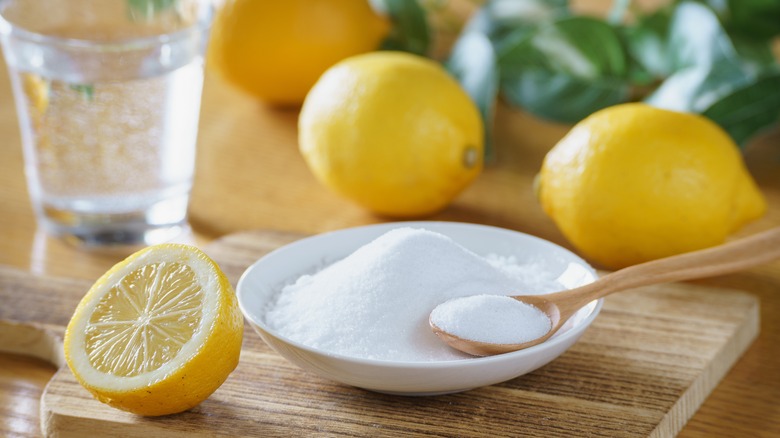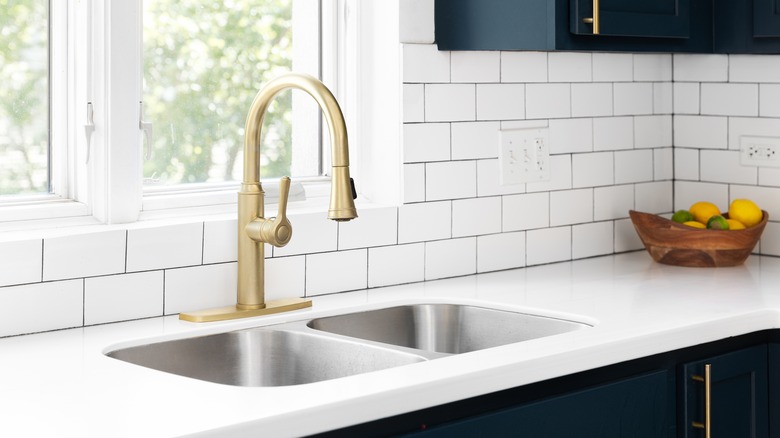The Unexpected Natural Cleaner That Is More Eco-Friendly Than Vinegar
When it comes to natural cleaning ingredients, vinegar is often crowned as the best non-toxic cleaning solution. White vinegar can make your kitchen sparkle, remove stains from clothing, and even safely eliminate pests. The cleaner is also known to be more eco-friendly than traditional products. However, vinegar isn't the end-all-be-all for eco-friendly cleaning solutions. Citric acid, which occurs naturally in fruits, is also a powerhouse natural cleaner that is even more eco-friendly than vinegar.
While vinegar is technically biodegradable, it's about 53 times more impactful on the environment than citric acid. This is because it takes much more water to neutralize acetic acid (the primary ingredient in white vinegar) than needed to neutralize citric acid. Additionally, white vinegar is typically sold in large plastic or glass containers, which likely causes more of a strain on the environment than the packaging for citric acid, which is typically much smaller.
Further, the production process of citric acid is natural, and has very little negative environmental impact. The production process for vinegar typically involves the fermentation of sugar to create alcohol and acetic acid, and is inherently natural. However, some types of vinegar sold in stores today are actually produced synthetically using petroleum, which has a very negative effect on the environment.
Citric acid as a cleaner
Citric acid works beautifully as a descaler, and is great for removing soap-scum, rust, and other mineral deposits. You can use citric acid to clean your kitchen, bathroom, and even in your laundry room. In the kitchen, citric acid is efficient at removing build-up from your dishwasher, cleaning stainless steel sinks, and removing coffee residue and limescale build-up from your coffee pot and electric kettle respectively. Citric acid also shines with its antibacterial and antifungal properties, and it is very useful for cleaning mold, mildew, and bacteria.
In the bathroom, citric acid is highly effective at cleaning grime from the toilet bowl, cleaning grout, and descaling your showerhead. By running diluted citric acid through your laundry machine, you can remove build-up from detergent, soap, and hard water. Citric acid can even be used as a fabric softener!
When it comes to how to clean with citric acid, you'll want to mix a cleaning solution with water and citric acid powder. A solution with 5% to 7% citric acid will suffice for most cleaning, and you can mix a more powerful 10% solution for more heavy duty jobs. While citric acid is a safe and non-toxic cleaner, you'll still want to use gloves and avoid skin contact as the acidity can cause irritation.
When to not use citric acid as a cleaner
Citric acid has many uses, but it's not without its limitations either. There are several places where you really should not use citric acid in your home, including on: wood floors, copper, brass, marble, granite, stone, and certain types of upholstery. Thanks to its corrosive properties, citric acid can damage these surfaces in your home, and it's best to clean them with other household cleaners. Citric acid is safe for the majority of upholstery however, and it's even able to lift stubborn rust stains from carpet. To be safe though, it's not a bad idea to test clean a small, hidden part of the upholstery before any extensive cleaning in case there is a negative reaction.
While citric acid cleaning solutions on their own are generally safe, they are not to be mixed with other cleaning chemicals, especially bleach. When bleach is mixed with acids, chlorine gas can be created, which can have very dangerous health effects, even with small exposure. However, as long as it's used safely, citric acid is an excellent natural household cleaner that's even more eco-friendly than vinegar.


